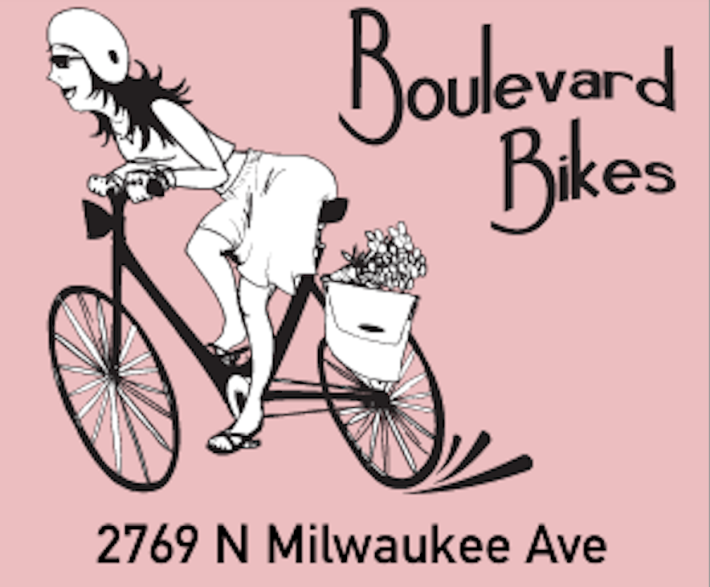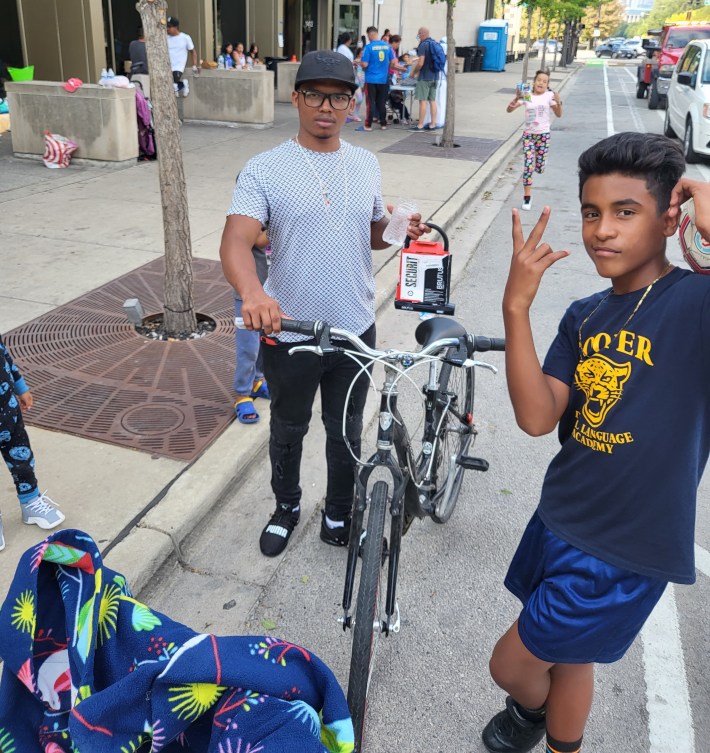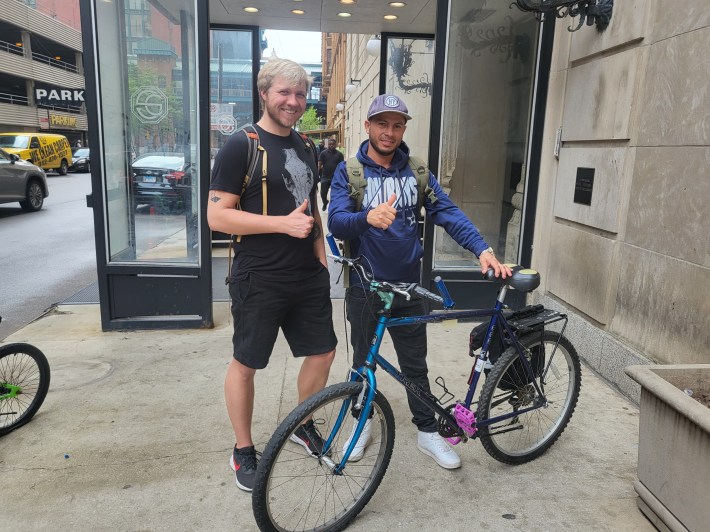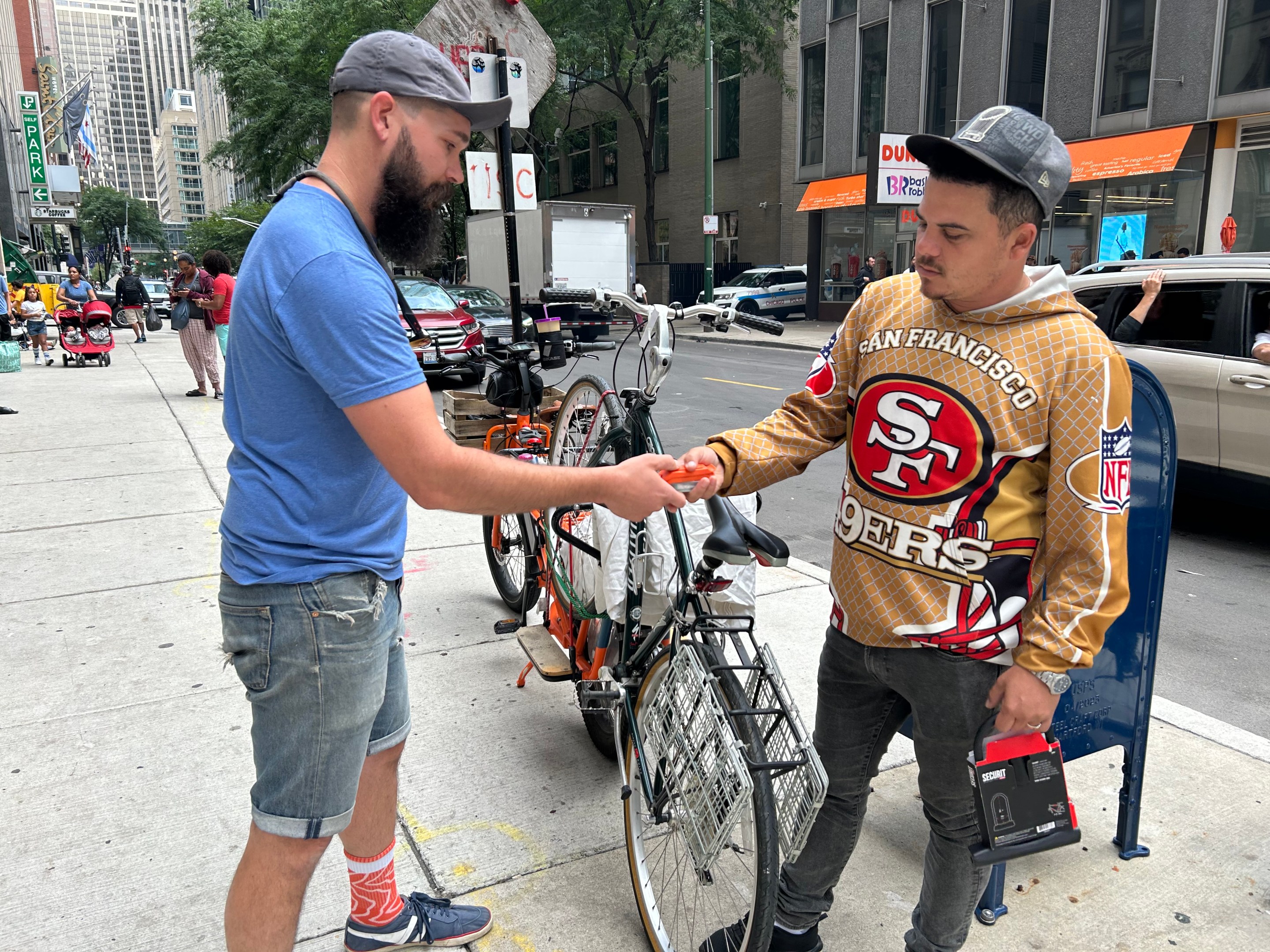
Alex and his family arrived in Chicago from Caracas, Venezuela six months ago. Like hundreds of migrants arriving in the city each week, they spent extended time sleeping on the floor of a police station. While sheltering there, Alex filled out a form to request a free bicycle. Three months later, Alex received a refurbished bike with back rack and baskets, fully loaded with lights, lock and maintenance kit, and hand-delivered to the curb outside Inn of Chicago, where Alex and his family had been relocated. Alex said he plans to seek work making food deliveries on his new wheels and begin earning income to support himself, his wife, and his two young children.
Alex is one of more than 200 asylum seekers who have requested bicycles through a grassroots effort by local bike shops and advocates to connect recent arrivals with an affordable means of transportation. However, pairing up bikes with recipients is a logistical puzzle that involves sizing, procurement, maintenance, storage and transportation.
First, the right size frame must be found. The bike needs to be in good working condition and outfitted with necessary safety and security gear. It then must then be stored until delivery is arranged to the recipient—who may have been relocated to a new shelter, or may not have a cell phone, and must be present for the handoff. Finally, the bike must be delivered and, ideally, some basic instruction provided on how to safely ride in the city, and what to expect on Chicago’s streets.
“Logistically, it has been very challenging to make this work,” says Andrew Mack, a founder of the organized effort to provide bikes to migrants. “I dropped off a bike at the police station last week and was just surrounded by people asking for bicycles. Right now, it’s on a case-by-case basis.”

Volunteers from the advocacy group Chicago, Bike Grid Now! and nonprofit bike shops Bikes N’ Roses, West Town Bikes and Working Bikes have been donating time, tools, talent, and space to make a dent in the mounting need. Rony Islam, a founder of Bike Grid, created an intake form for requests, and an Open Collective website for donations of bikes and funds for parts. It has raised about $1,700 to date.
Joel Campbell, program coordinator of Bikes N’ Roses, says his Belmont Cragin-based shop has sent out about 20 bikes and is storing another 30 in various stages of repair. About 20 volunteers have rotated through BN’R, helping to fix up bikes that have been matched with recipients. Similar efforts are taking place at Working Bikes in Pilsen and West Town Bikes in Humboldt Park.
But even with an outpouring of generosity, the current DIY system scratches the surface of the demand. Mack said the 200 hundred requests for bikes came within 48 hours of posting the request form at two locations: the Standard Club and Inn of Chicago. Organizers were forced to close the form out of capacity limitations. “We’re figuring out what each of us can take on without overextending ourselves,” Campbell said. “The reality is there needs to be some kind of financing or support to bolster this.”
About a month ago, the grassroots collaborators met with the Chicago Department of Transportation to explore how the city could help coordinate and scale up the effort. One ask of the agency is to secure a bike storage and pickup point downtown, close to where thousands of migrants are sheltering. Mack said the now-closed HUB312 bike station in Millennium Park would be an ideal spot.
Romina Castillo, director of outreach and engagement at CDOT, said no storage location has been identified yet, but she is hopeful of finding one. “Storage is difficult even for CDOT’s own [SAFE] Ambassador program. Some of our ambassadors are even storing bikes in their homes.”
The ambassador program, which provides free training on safe city biking, has offered some immediate support to the migrant effort with rider education. Castillo said CDOT deployed Spanish-speaking members of their team to five shelters so far, providing information to migrants on the rules of the road and what infrastructure to expect. Campbell said a Spanish language translation of CDOT’s Chicago Bike Map—which includes tips on theft prevention, avoiding dooring, proper signaling and best street-sharing practices—would be a huge help. The Bike Map is currently only available in English, and Castillo said a Spanish language version will be available when the 2024 update is released in the spring.

The arrival of thousands of new residents needing low-cost transportation is adding to an already overwhelming demand for bikes in Chicago. Last year, CDOT launched Bike Chicago, a distribution program that aims to give away 5,000 free bicycles to Chicagoans in need by 2026. Castillo said the agency received nearly 20,000 applications in the first year. “This program stretched the capacity for all our teams, which has also impacted how swiftly we can coordinate efforts and pull additional resources from our department.”
Working Bikes, West Town Bikes, and Bikes N’ Roses partner with CDOT to build the bicycles for Bike Chicago. Campbell said he would like to see the program expanded to include recent arrivals to the city. “What needs to happen is what the city is already doing with the bike giveaway program. It’s a solid model on how the city could intervene in something like this. If it could be expanded to include asylum seekers, that’s what we’re talking about.”
“Realistically, we’re dealing with all of this in a crisis footing," Campbell said. "It speaks to true care from the community, but it doesn’t have to be this way. Unless funds are freed up from a larger entity, it’s going to stay in this position indefinitely.”
In the meantime, volunteers continue taking it one request at a time. Alex’s bike arrived to Inn of Chicago by bicycle, strapped to Andrew Mack’s Radwagon cargo bike and pedaled from Bridgeport to the Gold Coast. Mack handed Alex a lock, tire lever, and patch kit and, with some help from Google translate, showed him the features of the bike. Alex shook his hand and immediately took it for a test ride.

Did you appreciate this post? Please consider making a tax-deductible donation.





